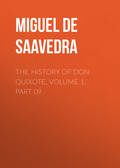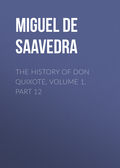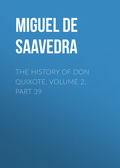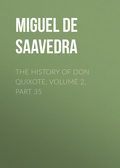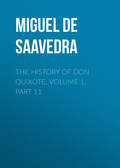
Мигель де Сервантес Сааведра
The History of Don Quixote, Volume 1, Part 01
From the moment the book came into his hands he seems to have been haunted by the fear that there might be more Avellanedas in the field, and putting everything else aside, he set himself to finish off his task and protect Don Quixote in the only way he could, by killing him. The conclusion is no doubt a hasty and in some places clumsy piece of work and the frequent repetition of the scolding administered to Avellaneda becomes in the end rather wearisome; but it is, at any rate, a conclusion and for that we must thank Avellaneda.
The new volume was ready for the press in February, but was not printed till the very end of 1615, and during the interval Cervantes put together the comedies and interludes he had written within the last few years, and, as he adds plaintively, found no demand for among the managers, and published them with a preface, worth the book it introduces tenfold, in which he gives an account of the early Spanish stage, and of his own attempts as a dramatist. It is needless to say they were put forward by Cervantes in all good faith and full confidence in their merits. The reader, however, was not to suppose they were his last word or final effort in the drama, for he had in hand a comedy called "Engano a los ojos," about which, if he mistook not, there would be no question.
Of this dramatic masterpiece the world has no opportunity of judging; his health had been failing for some time, and he died, apparently of dropsy, on the 23rd of April, 1616, the day on which England lost Shakespeare, nominally at least, for the English calendar had not yet been reformed. He died as he had lived, accepting his lot bravely and cheerfully.
Was it an unhappy life, that of Cervantes? His biographers all tell us that it was; but I must say I doubt it. It was a hard life, a life of poverty, of incessant struggle, of toil ill paid, of disappointment, but Cervantes carried within himself the antidote to all these evils. His was not one of those light natures that rise above adversity merely by virtue of their own buoyancy; it was in the fortitude of a high spirit that he was proof against it. It is impossible to conceive Cervantes giving way to despondency or prostrated by dejection. As for poverty, it was with him a thing to be laughed over, and the only sigh he ever allows to escape him is when he says, "Happy he to whom Heaven has given a piece of bread for which he is not bound to give thanks to any but Heaven itself." Add to all this his vital energy and mental activity, his restless invention and his sanguine temperament, and there will be reason enough to doubt whether his could have been a very unhappy life. He who could take Cervantes' distresses together with his apparatus for enduring them would not make so bad a bargain, perhaps, as far as happiness in life is concerned.
Of his burial-place nothing is known except that he was buried, in accordance with his will, in the neighbouring convent of Trinitarian nuns, of which it is supposed his daughter, Isabel de Saavedra, was an inmate, and that a few years afterwards the nuns removed to another convent, carrying their dead with them. But whether the remains of Cervantes were included in the removal or not no one knows, and the clue to their resting-place is now lost beyond all hope. This furnishes perhaps the least defensible of the items in the charge of neglect brought against his contemporaries. In some of the others there is a good deal of exaggeration. To listen to most of his biographers one would suppose that all Spain was in league not only against the man but against his memory, or at least that it was insensible to his merits, and left him to live in misery and die of want. To talk of his hard life and unworthy employments in Andalusia is absurd. What had he done to distinguish him from thousands of other struggling men earning a precarious livelihood? True, he was a gallant soldier, who had been wounded and had undergone captivity and suffering in his country's cause, but there were hundreds of others in the same case. He had written a mediocre specimen of an insipid class of romance, and some plays which manifestly did not comply with the primary condition of pleasing: were the playgoers to patronise plays that did not amuse them, because the author was to produce "Don Quixote" twenty years afterwards?
The scramble for copies which, as we have seen, followed immediately on the appearance of the book, does not look like general insensibility to its merits. No doubt it was received coldly by some, but if a man writes a book in ridicule of periwigs he must make his account with being coldly received by the periwig wearers and hated by the whole tribe of wigmakers. If Cervantes had the chivalry-romance readers, the sentimentalists, the dramatists, and the poets of the period all against him, it was because "Don Quixote" was what it was; and if the general public did not come forward to make him comfortable for the rest of his days, it is no more to be charged with neglect and ingratitude than the English-speaking public that did not pay off Scott's liabilities. It did the best it could; it read his book and liked it and bought it, and encouraged the bookseller to pay him well for others.
It has been also made a reproach to Spain that she has erected no monument to the man she is proudest of; no monument, that is to say, of him; for the bronze statue in the little garden of the Plaza de las Cortes, a fair work of art no doubt, and unexceptionable had it been set up to the local poet in the market-place of some provincial town, is not worthy of Cervantes or of Madrid. But what need has Cervantes of "such weak witness of his name;" or what could a monument do in his case except testify to the self-glorification of those who had put it up? Si monumentum quoeris, circumspice. The nearest bookseller's shop will show what bathos there would be in a monument to the author of "Don Quixote."
Nine editions of the First Part of "Don Quixote" had already appeared before Cervantes died, thirty thousand copies in all, according to his own estimate, and a tenth was printed at Barcelona the year after his death. So large a number naturally supplied the demand for some time, but by 1634 it appears to have been exhausted; and from that time down to the present day the stream of editions has continued to flow rapidly and regularly. The translations show still more clearly in what request the book has been from the very outset. In seven years from the completion of the work it had been translated into the four leading languages of Europe. Except the Bible, in fact, no book has been so widely diffused as "Don Quixote." The "Imitatio Christi" may have been translated into as many different languages, and perhaps "Robinson Crusoe" and the "Vicar of Wakefield" into nearly as many, but in multiplicity of translations and editions "Don Quixote" leaves them all far behind.
Still more remarkable is the character of this wide diffusion. "Don Quixote" has been thoroughly naturalised among people whose ideas about knight-errantry, if they had any at all, were of the vaguest, who had never seen or heard of a book of chivalry, who could not possibly feel the humour of the burlesque or sympathise with the author's purpose. Another curious fact is that this, the most cosmopolitan book in the world, is one of the most intensely national. "Manon Lescaut" is not more thoroughly French, "Tom Jones" not more English, "Rob Roy" not more Scotch, than "Don Quixote" is Spanish, in character, in ideas, in sentiment, in local colour, in everything. What, then, is the secret of this unparalleled popularity, increasing year by year for well-nigh three centuries? One explanation, no doubt, is that of all the books in the world, "Don Quixote" is the most catholic. There is something in it for every sort of reader, young or old, sage or simple, high or low. As Cervantes himself says with a touch of pride, "It is thumbed and read and got by heart by people of all sorts; the children turn its leaves, the young people read it, the grown men understand it, the old folk praise it."
But it would be idle to deny that the ingredient which, more than its humour, or its wisdom, or the fertility of invention or knowledge of human nature it displays, has insured its success with the multitude, is the vein of farce that runs through it. It was the attack upon the sheep, the battle with the wine-skins, Mambrino's helmet, the balsam of Fierabras, Don Quixote knocked over by the sails of the windmill, Sancho tossed in the blanket, the mishaps and misadventures of master and man, that were originally the great attraction, and perhaps are so still to some extent with the majority of readers. It is plain that "Don Quixote" was generally regarded at first, and indeed in Spain for a long time, as little more than a queer droll book, full of laughable incidents and absurd situations, very amusing, but not entitled to much consideration or care. All the editions printed in Spain from 1637 to 1771, when the famous printer Ibarra took it up, were mere trade editions, badly and carelessly printed on vile paper and got up in the style of chap-books intended only for popular use, with, in most instances, uncouth illustrations and clap-trap additions by the publisher.
To England belongs the credit of having been the first country to recognise the right of "Don Quixote" to better treatment than this. The London edition of 1738, commonly called Lord Carteret's from having been suggested by him, was not a mere edition de luxe. It produced "Don Quixote" in becoming form as regards paper and type, and embellished with plates which, if not particularly happy as illustrations, were at least well intentioned and well executed, but it also aimed at correctness of text, a matter to which nobody except the editors of the Valencia and Brussels editions had given even a passing thought; and for a first attempt it was fairly successful, for though some of its emendations are inadmissible, a good many of them have been adopted by all subsequent editors.
The zeal of publishers, editors, and annotators brought about a remarkable change of sentiment with regard to "Don Quixote." A vast number of its admirers began to grow ashamed of laughing over it. It became almost a crime to treat it as a humorous book. The humour was not entirely denied, but, according to the new view, it was rated as an altogether secondary quality, a mere accessory, nothing more than the stalking-horse under the presentation of which Cervantes shot his philosophy or his satire, or whatever it was he meant to shoot; for on this point opinions varied. All were agreed, however, that the object he aimed at was not the books of chivalry. He said emphatically in the preface to the First Part and in the last sentence of the Second, that he had no other object in view than to discredit these books, and this, to advanced criticism, made it clear that his object must have been something else.
One theory was that the book was a kind of allegory, setting forth the eternal struggle between the ideal and the real, between the spirit of poetry and the spirit of prose; and perhaps German philosophy never evolved a more ungainly or unlikely camel out of the depths of its inner consciousness. Something of the antagonism, no doubt, is to be found in "Don Quixote," because it is to be found everywhere in life, and Cervantes drew from life. It is difficult to imagine a community in which the never-ceasing game of cross-purposes between Sancho Panza and Don Quixote would not be recognized as true to nature. In the stone age, among the lake dwellers, among the cave men, there were Don Quixotes and Sancho Panzas; there must have been the troglodyte who never could see the facts before his eyes, and the troglodyte who could see nothing else. But to suppose Cervantes deliberately setting himself to expound any such idea in two stout quarto volumes is to suppose something not only very unlike the age in which he lived, but altogether unlike Cervantes himself, who would have been the first to laugh at an attempt of the sort made by anyone else.
The extraordinary influence of the romances of chivalry in his day is quite enough to account for the genesis of the book. Some idea of the prodigious development of this branch of literature in the sixteenth century may be obtained from the scrutiny of Chapter VII, if the reader bears in mind that only a portion of the romances belonging to by far the largest group are enumerated. As to its effect upon the nation, there is abundant evidence. From the time when the Amadises and Palmerins began to grow popular down to the very end of the century, there is a steady stream of invective, from men whose character and position lend weight to their words, against the romances of chivalry and the infatuation of their readers. Ridicule was the only besom to sweep away that dust.
That this was the task Cervantes set himself, and that he had ample provocation to urge him to it, will be sufficiently clear to those who look into the evidence; as it will be also that it was not chivalry itself that he attacked and swept away. Of all the absurdities that, thanks to poetry, will be repeated to the end of time, there is no greater one than saying that "Cervantes smiled Spain's chivalry away." In the first place there was no chivalry for him to smile away. Spain's chivalry had been dead for more than a century. Its work was done when Granada fell, and as chivalry was essentially republican in its nature, it could not live under the rule that Ferdinand substituted for the free institutions of mediaeval Spain. What he did smile away was not chivalry but a degrading mockery of it.
The true nature of the "right arm" and the "bright array," before which, according to the poet, "the world gave ground," and which Cervantes' single laugh demolished, may be gathered from the words of one of his own countrymen, Don Felix Pacheco, as reported by Captain George Carleton, in his "Military Memoirs from 1672 to 1713." "Before the appearance in the world of that labour of Cervantes," he said, "it was next to an impossibility for a man to walk the streets with any delight or without danger. There were seen so many cavaliers prancing and curvetting before the windows of their mistresses, that a stranger would have imagined the whole nation to have been nothing less than a race of knight-errants. But after the world became a little acquainted with that notable history, the man that was seen in that once celebrated drapery was pointed at as a Don Quixote, and found himself the jest of high and low. And I verily believe that to this, and this only, we owe that dampness and poverty of spirit which has run through all our councils for a century past, so little agreeable to those nobler actions of our famous ancestors."
To call "Don Quixote" a sad book, preaching a pessimist view of life, argues a total misconception of its drift. It would be so if its moral were that, in this world, true enthusiasm naturally leads to ridicule and discomfiture. But it preaches nothing of the sort; its moral, so far as it can be said to have one, is that the spurious enthusiasm that is born of vanity and self-conceit, that is made an end in itself, not a means to an end, that acts on mere impulse, regardless of circumstances and consequences, is mischievous to its owner, and a very considerable nuisance to the community at large. To those who cannot distinguish between the one kind and the other, no doubt "Don Quixote" is a sad book; no doubt to some minds it is very sad that a man who had just uttered so beautiful a sentiment as that "it is a hard case to make slaves of those whom God and Nature made free," should be ungratefully pelted by the scoundrels his crazy philanthropy had let loose on society; but to others of a more judicial cast it will be a matter of regret that reckless self-sufficient enthusiasm is not oftener requited in some such way for all the mischief it does in the world.
A very slight examination of the structure of "Don Quixote" will suffice to show that Cervantes had no deep design or elaborate plan in his mind when he began the book. When he wrote those lines in which "with a few strokes of a great master he sets before us the pauper gentleman," he had no idea of the goal to which his imagination was leading him. There can be little doubt that all he contemplated was a short tale to range with those he had already written, a tale setting forth the ludicrous results that might be expected to follow the attempt of a crazy gentleman to act the part of a knight-errant in modern life.
It is plain, for one thing, that Sancho Panza did not enter into the original scheme, for had Cervantes thought of him he certainly would not have omitted him in his hero's outfit, which he obviously meant to be complete. Him we owe to the landlord's chance remark in Chapter III that knights seldom travelled without squires. To try to think of a Don Quixote without Sancho Panza is like trying to think of a one-bladed pair of scissors.
The story was written at first, like the others, without any division and without the intervention of Cide Hamete Benengeli; and it seems not unlikely that Cervantes had some intention of bringing Dulcinea, or Aldonza Lorenzo, on the scene in person. It was probably the ransacking of the Don's library and the discussion on the books of chivalry that first suggested it to him that his idea was capable of development. What, if instead of a mere string of farcical misadventures, he were to make his tale a burlesque of one of these books, caricaturing their style, incidents, and spirit?
In pursuance of this change of plan, he hastily and somewhat clumsily divided what he had written into chapters on the model of "Amadis," invented the fable of a mysterious Arabic manuscript, and set up Cide Hamete Benengeli in imitation of the almost invariable practice of the chivalry-romance authors, who were fond of tracing their books to some recondite source. In working out the new ideas, he soon found the value of Sancho Panza. Indeed, the keynote, not only to Sancho's part, but to the whole book, is struck in the first words Sancho utters when he announces his intention of taking his ass with him. "About the ass," we are told, "Don Quixote hesitated a little, trying whether he could call to mind any knight-errant taking with him an esquire mounted on ass-back; but no instance occurred to his memory." We can see the whole scene at a glance, the stolid unconsciousness of Sancho and the perplexity of his master, upon whose perception the incongruity has just forced itself. This is Sancho's mission throughout the book; he is an unconscious Mephistopheles, always unwittingly making mockery of his master's aspirations, always exposing the fallacy of his ideas by some unintentional ad absurdum, always bringing him back to the world of fact and commonplace by force of sheer stolidity.
By the time Cervantes had got his volume of novels off his hands, and summoned up resolution enough to set about the Second Part in earnest, the case was very much altered. Don Quixote and Sancho Panza had not merely found favour, but had already become, what they have never since ceased to be, veritable entities to the popular imagination. There was no occasion for him now to interpolate extraneous matter; nay, his readers told him plainly that what they wanted of him was more Don Quixote and more Sancho Panza, and not novels, tales, or digressions. To himself, too, his creations had become realities, and he had become proud of them, especially of Sancho. He began the Second Part, therefore, under very different conditions, and the difference makes itself manifest at once. Even in translation the style will be seen to be far easier, more flowing, more natural, and more like that of a man sure of himself and of his audience. Don Quixote and Sancho undergo a change also. In the First Part, Don Quixote has no character or individuality whatever. He is nothing more than a crazy representative of the sentiments of the chivalry romances. In all that he says and does he is simply repeating the lesson he has learned from his books; and therefore, it is absurd to speak of him in the gushing strain of the sentimental critics when they dilate upon his nobleness, disinterestedness, dauntless courage, and so forth. It was the business of a knight-errant to right wrongs, redress injuries, and succour the distressed, and this, as a matter of course, he makes his business when he takes up the part; a knight-errant was bound to be intrepid, and so he feels bound to cast fear aside. Of all Byron's melodious nonsense about Don Quixote, the most nonsensical statement is that "'t is his virtue makes him mad!" The exact opposite is the truth; it is his madness makes him virtuous.
In the Second Part, Cervantes repeatedly reminds the reader, as if it was a point upon which he was anxious there should be no mistake, that his hero's madness is strictly confined to delusions on the subject of chivalry, and that on every other subject he is discreto, one, in fact, whose faculty of discernment is in perfect order. The advantage of this is that he is enabled to make use of Don Quixote as a mouthpiece for his own reflections, and so, without seeming to digress, allow himself the relief of digression when he requires it, as freely as in a commonplace book.
It is true the amount of individuality bestowed upon Don Quixote is not very great. There are some natural touches of character about him, such as his mixture of irascibility and placability, and his curious affection for Sancho together with his impatience of the squire's loquacity and impertinence; but in the main, apart from his craze, he is little more than a thoughtful, cultured gentleman, with instinctive good taste and a great deal of shrewdness and originality of mind.
As to Sancho, it is plain, from the concluding words of the preface to the First Part, that he was a favourite with his creator even before he had been taken into favour by the public. An inferior genius, taking him in hand a second time, would very likely have tried to improve him by making him more comical, clever, amiable, or virtuous. But Cervantes was too true an artist to spoil his work in this way. Sancho, when he reappears, is the old Sancho with the old familiar features; but with a difference; they have been brought out more distinctly, but at the same time with a careful avoidance of anything like caricature; the outline has been filled in where filling in was necessary, and, vivified by a few touches of a master's hand, Sancho stands before us as he might in a character portrait by Velazquez. He is a much more important and prominent figure in the Second Part than in the First; indeed, it is his matchless mendacity about Dulcinea that to a great extent supplies the action of the story.
His development in this respect is as remarkable as in any other. In the First Part he displays a great natural gift of lying. His lies are not of the highly imaginative sort that liars in fiction commonly indulge in; like Falstaff's, they resemble the father that begets them; they are simple, homely, plump lies; plain working lies, in short. But in the service of such a master as Don Quixote he develops rapidly, as we see when he comes to palm off the three country wenches as Dulcinea and her ladies in waiting. It is worth noticing how, flushed by his success in this instance, he is tempted afterwards to try a flight beyond his powers in his account of the journey on Clavileno.
In the Second Part it is the spirit rather than the incidents of the chivalry romances that is the subject of the burlesque. Enchantments of the sort travestied in those of Dulcinea and the Trifaldi and the cave of Montesinos play a leading part in the later and inferior romances, and another distinguishing feature is caricatured in Don Quixote's blind adoration of Dulcinea. In the romances of chivalry love is either a mere animalism or a fantastic idolatry. Only a coarse-minded man would care to make merry with the former, but to one of Cervantes' humour the latter was naturally an attractive subject for ridicule. Like everything else in these romances, it is a gross exaggeration of the real sentiment of chivalry, but its peculiar extravagance is probably due to the influence of those masters of hyperbole, the Provencal poets. When a troubadour professed his readiness to obey his lady in all things, he made it incumbent upon the next comer, if he wished to avoid the imputation of tameness and commonplace, to declare himself the slave of her will, which the next was compelled to cap by some still stronger declaration; and so expressions of devotion went on rising one above the other like biddings at an auction, and a conventional language of gallantry and theory of love came into being that in time permeated the literature of Southern Europe, and bore fruit, in one direction in the transcendental worship of Beatrice and Laura, and in another in the grotesque idolatry which found exponents in writers like Feliciano de Silva. This is what Cervantes deals with in Don Quixote's passion for Dulcinea, and in no instance has he carried out the burlesque more happily. By keeping Dulcinea in the background, and making her a vague shadowy being of whose very existence we are left in doubt, he invests Don Quixote's worship of her virtues and charms with an additional extravagance, and gives still more point to the caricature of the sentiment and language of the romances.
One of the great merits of "Don Quixote," and one of the qualities that have secured its acceptance by all classes of readers and made it the most cosmopolitan of books, is its simplicity. There are, of course, points obvious enough to a Spanish seventeenth century audience which do not immediately strike a reader now-a-days, and Cervantes often takes it for granted that an allusion will be generally understood which is only intelligible to a few. For example, on many of his readers in Spain, and most of his readers out of it, the significance of his choice of a country for his hero is completely lost. It would be going too far to say that no one can thoroughly comprehend "Don Quixote" without having seen La Mancha, but undoubtedly even a glimpse of La Mancha will give an insight into the meaning of Cervantes such as no commentator can give. Of all the regions of Spain it is the last that would suggest the idea of romance. Of all the dull central plateau of the Peninsula it is the dullest tract. There is something impressive about the grim solitudes of Estremadura; and if the plains of Leon and Old Castile are bald and dreary, they are studded with old cities renowned in history and rich in relics of the past. But there is no redeeming feature in the Manchegan landscape; it has all the sameness of the desert without its dignity; the few towns and villages that break its monotony are mean and commonplace, there is nothing venerable about them, they have not even the picturesqueness of poverty; indeed, Don Quixote's own village, Argamasilla, has a sort of oppressive respectability in the prim regularity of its streets and houses; everything is ignoble; the very windmills are the ugliest and shabbiest of the windmill kind.
To anyone who knew the country well, the mere style and title of "Don Quixote of La Mancha" gave the key to the author's meaning at once. La Mancha as the knight's country and scene of his chivalries is of a piece with the pasteboard helmet, the farm-labourer on ass-back for a squire, knighthood conferred by a rascally ventero, convicts taken for victims of oppression, and the rest of the incongruities between Don Quixote's world and the world he lived in, between things as he saw them and things as they were.



